#pirates of the caribbean meta
Text
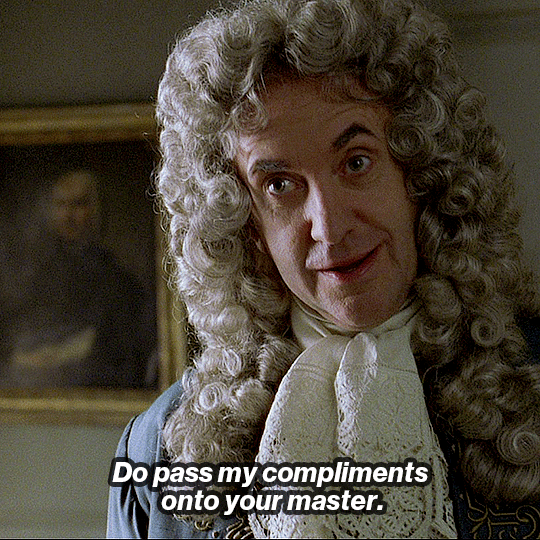
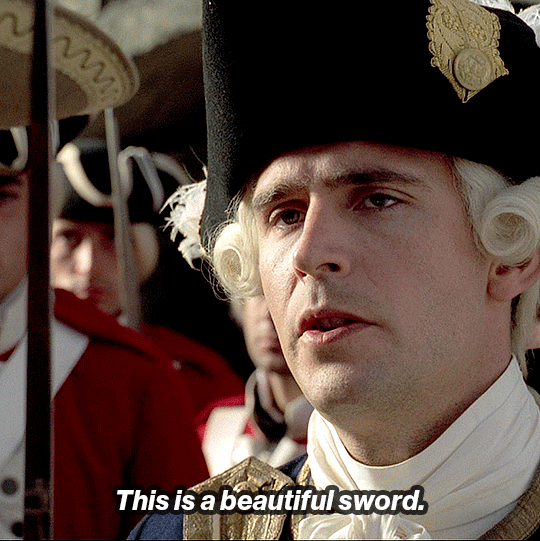
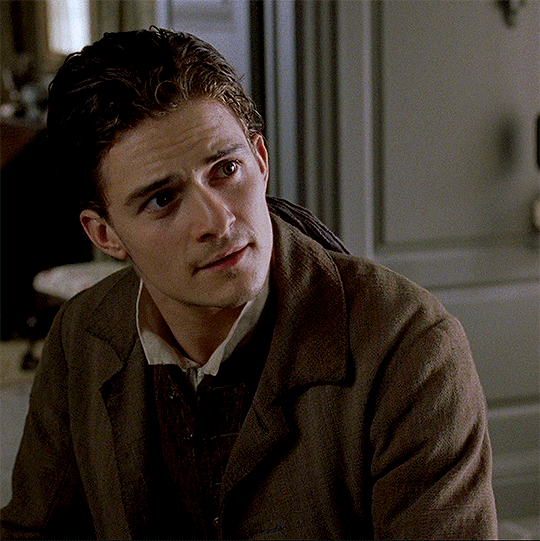
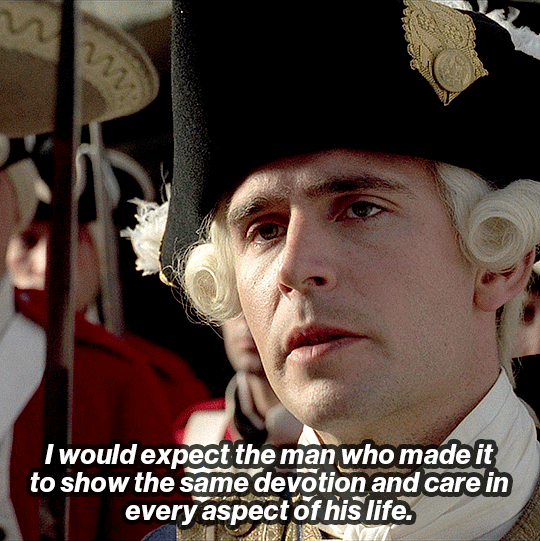
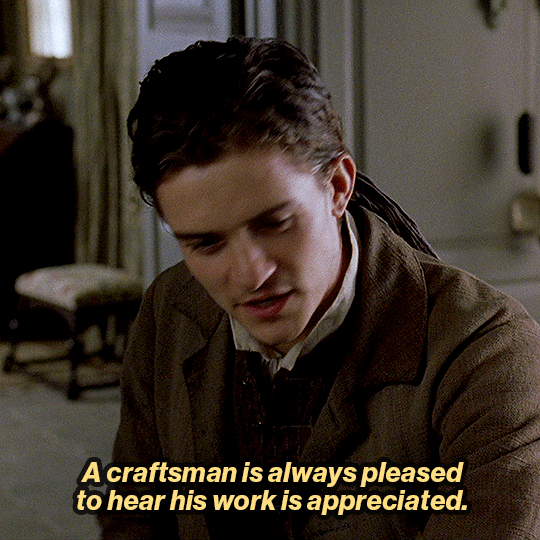
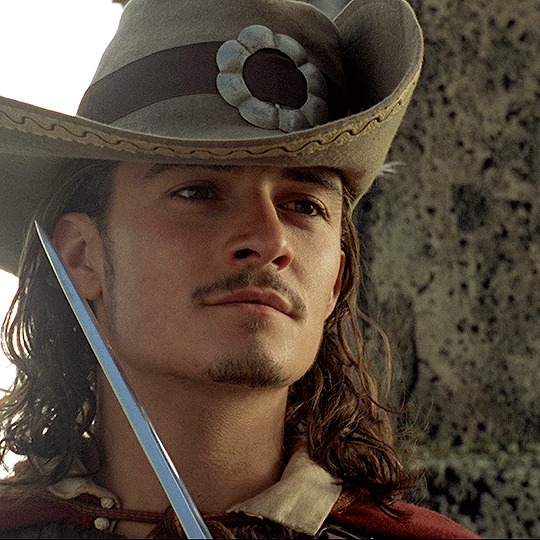
#pirates of the caribbean#the curse of the black pearl#potcedit#disneyedit#filmedit#perioddramaedit#(...am i allowed to use that tag for the fantasy theme park swashbuckler movies)#weatherby swann#will turner#james norrington#gif: potc#*userbolt#the way jdav makes bedroom eyes at that sword. me too dude#can someone smarter than me write the meta about will and his pride thank you in advance <3#edit: hell. why not i'll give the sword its own tag#destiny sword#notes
974 notes
·
View notes
Text
Now that I’m older, it’s occurred to me that Jack Sparrow really does play the role of the mentor figure in Curse of the Black Pearl. He’s definitely a very cleverly subversive take on the trope, but he is a take on it nonetheless; The older figure who teaches our young, hotshot hero how to act and passes on wisdom. “I knew your father.” An experienced member of a forbidden group that our protagonist learns to accept he is a part of. Acts as a call to action, and isn’t introduced until past the first few scenes of the film.
By contrast, Elizabeth and Will are established in the movie’s first scene, which further strengthens the actually hot take that they’re the main protagonists of the film and the trilogy as a whole, not Jack. Jack is just less recognizable as a mentor because he breaks a lot of the rules (more guidelines really) of the trope, and is treated as more than just a tool for our main character’s growth; He’s someone with his own life and wants and stake in this, too.
Jack Sparrow is ultimately the Gandalf, the Obi-Wan of Pirates of the Caribbean. And that leads me to my argument that PotC is the Star Wars of its generation, with its own Empire Strikes Back and everything. It’s got a lot of the same tropes and structure, but it’s mixed around and dressed up in such a unique way that most people fail to realize this at first glance.
Take for example, the dynamic of Davy Jones and Cutler Beckett... This is just Vader and Tarkin in A New Hope; A more iconic, supernatural threat, physically imposing, who is nevertheless subservient to Just Some Guy who is British and represents the Machine that strips the world of its magic and wonder. Vader and Jones are more romantic, they’ve got sad backstories and are humanized to the audience; But Tarkin and Beckett are banal and simple, just ruthless men who don’t care, like in real life.
But while Tarkin dies in the first film to make way for Vader taking the spotlight, as well as his similarly theatrical Emperor, the creators of PotC clearly wanted to explore the dynamic of a supernatural force straining against his imperial collar, and the tension of knowing he is contributing to the decline of his own kind. They took Vader and Tarkin’s relationship and made it front and center, happening at the end of the trilogy and not at its beginning. And it is Beckett and the imperial machine that is emphasized as the true evil, whereas in Star Wars, the Empire takes orders from Palpatine and his Dark Side shenanigans, who are framed as the foundation for the conflict.
The crew reinvented Star Wars for a new audience, rather than just... pulling off of the brand and imagery of Star Wars, or copying it word-for-word. They understood the core foundation of the story and the earnest creativity that comes into making something both familiar yet inarguably new, which subverts the stories that came before it in a meaningful manner.
#pirates of the caribbean#potc#jack sparrow#davy jones#cutler beckett#curse of the black pearl#cotbp#star wars#meta#analysis
421 notes
·
View notes
Text
So I was thinking about pirates of the Caribbean, and each characters unique moral code and way of approaching life, as one does, when I remembered a particular scene about our beloved James Norrington... the very first scene in which Jack and James meet. Now, as a long time Sparrington shipper, I adore the Sparrington fandoms adopted head canon of Jack's compass pointing directly at Jack when James is holding it as having a romantic connotation too it, but this is Disney we're talking about, and a Disney from 20 years ago at that, so it is of course just a head canon. And while it is a beloved head canon, I will always be a writer before a shipper, and what that scene says about Norrington from a writer's perspective is far too juicy not to share... So buckle up for a very long meta post about who James Norrington is as a person, and how it was set up in this scene(and later reinforced in the second and third movie). This is my first real meta post, and I'm very excited for it, so let's jump right in.
First of all, the compass scene.
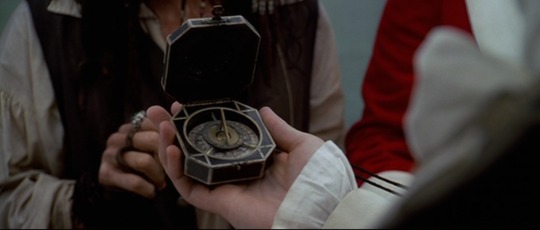
As we can clearly see in the image above, since the red line that points to the object of the holder's desires is no where to be seen, its relatively easy to conclude that it's hidden from our view by the sun dial in the middle, and thusly is pointing directly at Jack. Elizabeth is off to James's right, and no one is standing behind Jack, so unless the compass was pointing at something in the far off distance that just so happened to be in Jack's general direction(unlikely) its pretty clear what(or who) the compass is pointing at. For most potc fans, this is fairly standard knowledge. But it's what this fact says about Norrington's character that I'd like to focus on. After all, what does it say about a man that a compass that shows you what you desire most is pointing at a pirate, and the very face of piracy at that, instead of your canonical love interest, when you're a Commodore of the Navy? As stated above, Sparrington shippers often point at this scene as proof that James has a bit of a pash on the ruggedly handsome pirate, or at the very least, a thing for men. But from a writer's perspective, this just simply isn't the case, and not because the writer's in this instance are the notoriously homophobic corporation we call Disney. The reason why this is so unlikely from a writing perspective is because given the context clues, we as an audience are meant to draw the conclusion that this is the first time that they meet(I have heard rumors of them meeting as children in the books, but having never read them, and focusing only on the movies, I'm not including that in this post). And since this is the first time they've met, it's highly unlikely that the compass is pointing at Jack because James has a bit of a thing for him. Even if James has heard of Jack's many exploits, he does not truly know the man behind the legend, so having romantic feelings for the pirate at this point in time just isn't believable. And even if James was a closeted gay/bi man, it's still unlikely that the compass would be pointing at Jack of all the men around the Commodore(of which there is a lot, some of whom he is incredibly close with) seeing as Jack is the poster boy of piracy, and at this point in the movie it's made abundantly clear that James vehemently detests the notion and all who practice it. If James were to be holding the compass in Jack's vicinity in later movies and it still pointed at the pirate, an argument could definitely be made that it was because he had developed feelings for Jack, but for their first meeting, it's just not realistic. So it's much more likely that the reason the compass is pointing at Jack is because of James's desire to send every pirate he meets to "a quick drop and a sudden stop" as he so eloquently put it to a young Elizabeth. This is further reinforced in the third movie when it is revealed that Beckett's desire to have Jack dead at his feet would prevent him from using the compass to find Shipwreck Cove if the pirate was not already at the aforementioned location, or, well, dead. This is again, relatively common knowledge. But like I said before, it's what this fact says about James that is the whole point of this post... and that is that James cares more about his career than anything else, even the woman he claims to love. Now for some, that statement alone might seem like a pretty obvious conclusion, but it's how this scene subtlety sets up this core aspect of Norrington's character before we even truly get to know who he is, and how it's brought to it's full height in the second movie, and the core aspect of his redemption and subsequent death in the third that I'd really like to talk about. Which brings us to the next segment of this post...
How James lost his commission to the navy...
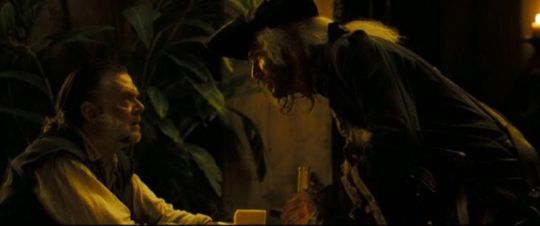
And how he got it back
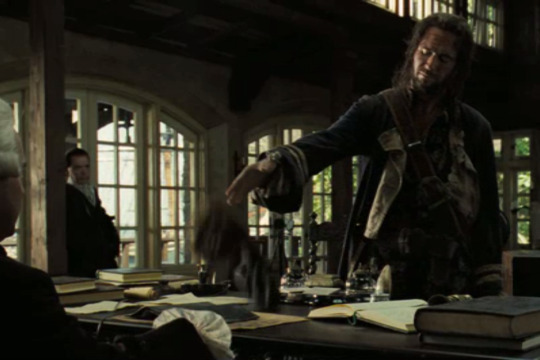
So let's start off with how James lost his commission... it's a story we all know pretty well, and one he tells to Gibbs in the scene shown above, when he plans to either join Jack's crew or get revenge on the man that(he believes) ruined his life. After Jack's escape in the first movie, James grew obsessed with capturing the pirate, so much so that he foolishly followed the Black Pearl into a hurricane, resulting in the sinking of the Dauntless, and the loss of countless lives that had been aboard the vessel. It's unclear aside from James himself who had been on the ship at the time, and who did or did not survive, but the death toll was heavy, with most, if not everyone who wasn't James, having perished in the storm. While it is not the most extreme example(which we'll get too in just a bit), this is a pretty clear example of James prioritizing his career above everything else, even reason and logic. And all just to capture a singular pirate, even at the cost of his own ship and crew, and rather ironically, the very career that he had been so desperately trying to hold onto in the first place. Which brings us to the next scene I'd like to discuss... James stealing the heart of Davy Jones. This moment is the absolute peak of this part of James's character. This is the moment where James takes his obsessive need for his career to the max. This is the moment where James truly prioritizes his career above everything else, even the woman he claims to love(and for Sparrington shippers, above the man he's reluctantly come to care about). At this point in time, when James decides to take the heart for himself to regain his old station, he's been on the Black Pearl long enough to know the full situation. That Jack is in some kind of trouble with Davy Jones, and that if Jack doesn't use the heart to bargain for his freedom, then the Kraken will hunt Jack, and subsequently the Black Pearl, down until he and everyone aboard are dead. And that includes Elizabeth. And yet, despite knowing that stealing the heart would basically mean sealing Elizabeth's death, he still decided to do so. Sure, the argument could be made that he thought Elizabeth would be able to escape somehow, but the chances of her dying at sea, or some other terrible fate befalling her before she could safely make it back to civilization would have been highly likely. Of course we as an audience know that this isn't the case, but James does not. So essentially, James was so obsessed with his career, and maintaining the image of the honorable Commodore that he didn't even truly register that he was putting Elizabeth, the woman he loves and has been trying so desperately to woo for the past two movies, in danger. And he won't fully realize the consequences of his actions until the third movie, in a deleted scene no less(I swear when I find whoever decided to delete some of the most important scenes to James's character...), when Davy Jones informs Governor Swann of his daughters untimely demise on the Black Pearl. Of course, almost immediately afterwards, Beckett retcons that statement by informing the Governor that Elizabeth was recently seen in Singapore, but for a few minutes, James has to sit with the fact that Elizabeth was dead, and it was his fault. And even after learning that she was in fact still alive, James has now finally come to the realization that if she had still been on the Black Pearl when it sank with its Captain, he would've been the one to send her to her death. And for Sparrington shippers, James has to sit with the unavoidable fact that he was the reason Jack had died(even if the pirate does come back), despite the fact that it was Elizabeth's betrayal that was the final nail in Jack's coffin, since she wouldn't have had to do that if the Kraken wasn't after them in the first place. Which brings us to the final scene I'd like to discuss...
James choosing a side, and paying the price

Now, before we fully delve into this scene, I'd like to take a moment to talk about James's own perception of himself, and his relationship with honor and integrity. From the very first scene in which we meet James Norrington, we are made aware that he has a strong moral compass. He firmly believes piracy is evil, and that all who partake in piracy deserve a swift end. He perceives his Commodore persona as being the paragon of honor and integrity, and the sole arbiter of justice. We can infer from the line "By remembering that I serve others, Sparrow, not just myself" that James does have honorable intentions when ridding the world of pirates, that being protecting the innocent citizens under his care, but as seen once again in the first time James and Jack meet, wherein James adamantly tries to arrest Jack despite the fact the fact that pirate had just saved Elizabeth's life, his actions to achieve that goal are not always quite as honorable as his intentions are. This is especially highlighted once again when James gave Beckett the heart of Davy Jones. James's intentions here were once again rooted in honor and integrity - he believes that the only way to keep people safe from pirates is too return to his old station, to the image of honor and integrity he had built around the title of Commodore, and the only way to return to his old station is to give Beckett the heart. But the action itself was far from honorable, seeing as James had to betray the woman he loved just to obtain the heart, and that he was now putting it into the hands of a dangerously unstable individual who planned on using it to commit mass genocide.
And now, we finally get to the scene above... Of course, it's made clear throughout his scenes in the third movie leading up to this one that James is already starting to regret giving Beckett the heart after seeing the damage being caused, but since Beckett is targeting pirates specifically(although we as an audience know that Beckett's definition of pirate is very loose) James figures that the ends justify the means, as he often does in situations regarding piracy. It is not until his reunion with Elizabeth, where he learns that Governor Swann is dead, and that Beckett lied to him about the Governor's whereabouts, that James truly realizes the enormity of his mistake. It is in this moment that James has a sudden realization that fundamentally shakes him to his core, and is the reason behind his change of heart later on. He realizes that the honorable Commodore persona that he had tried to cultivate and keep a hold of for so long had never been truly honorable at all, and that by giving Beckett the heart of Davy Jones, he had effectively tied the noose around the neck of his own honor and integrity, as well as the necks of hundreds, if not thousands of innocent people, with his own hands. And as that one vine goes, this was the moment James knew, he fucked up. Which leads to his decision to change sides in an attempt to redeem himself, and his subsequent death in the process. Of course, part of James's reason for helping Elizabeth escape was that he does care for her, but given everything I've detailed about him so far, I think it's safe to say the main reason that James decided to help Elizabeth and her crew was because he wanted to undo the damage he had done, and he had faith that Elizabeth, Will, and Jack would have some sort of plan to defeat Beckett, and stop any further damage to come from his mistake. And now, for his death scene itself... As much as I love the idea of James surviving and joining the pirates(whether at Elizabeth's side or Jack's is unimportant), I firmly believe that his death was a necessary end of this part of his character arc, and that if he were to survive he would still have to go through a major ego death for this part of his character arc to end properly. Because as Bill turner drives that wooden pike into James's gut, it's not just the physical death of his body, but also the metaphorical death of Admiral James Norrington, and the ideals that James had used to build the persona out of. So even if James survived, the Admiral would still have to meet his metaphorical end, thusly causing James to lose a core part of himself that had been guiding most his decisions so far, in the process, which would start the next part of his character arc, where he would have to deal with the loss of a key part of his personality, and rebuild himself from the ground up to finally, truly become the image of honor and integrity he had envisioned from the beginning.
And that concludes this very long post. I could probably wax enough poetics about this aspect of James's character to write a short novel, but I've said everything important to this post, and if I go on any longer, I'm likely to start repeating myself lol. Thank you for reading, and feel free to share your thoughts in the comments or a reblog! I will always love hearing more about our polished peacock <3
#pirates of the caribbean#james norrington#jack sparrow#elizabeth swann#cutler beckett#davy jones#sparrington#norribeth#meta#potc meta#a character study of james norrington
182 notes
·
View notes
Text
rewatching pirates of the caribbean and looking at the Jack Sparrow family tree made me realize a very funny thing.
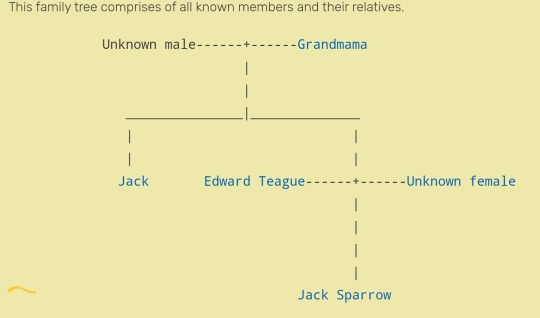
Edward Teague is Jacks father.
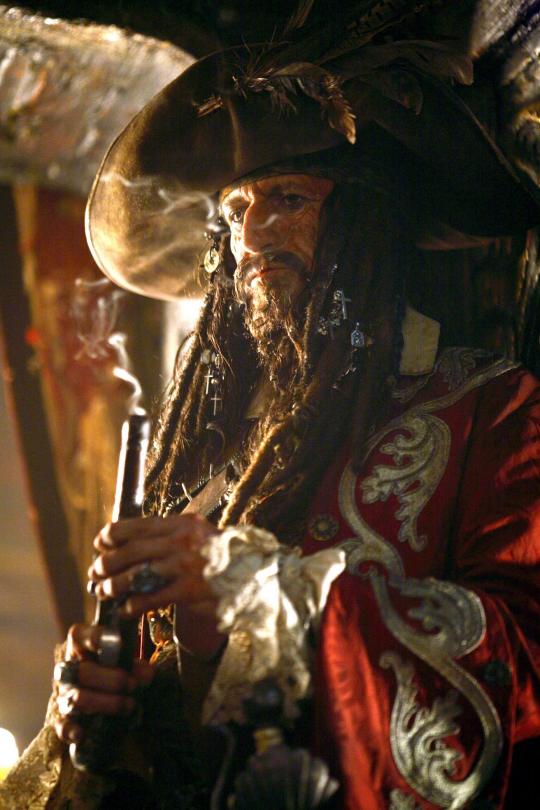
He is losely based on Edward Teach.
(I know there's a Blackbeard in Pirates of the Caribbean, who is called Edward Teach, but let's ignore that for a second. Blackbeard is a name losely used for any captain who has the vibe honestly.)
If Edward Teague aka Jack Sparrows Dad was Blackbeard....
he-

would be Jacks Dad.
And Stede would be his Mom.
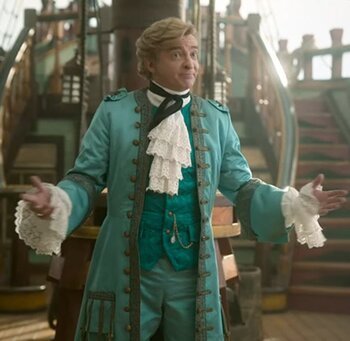
Jack Sparrow has gay parents.
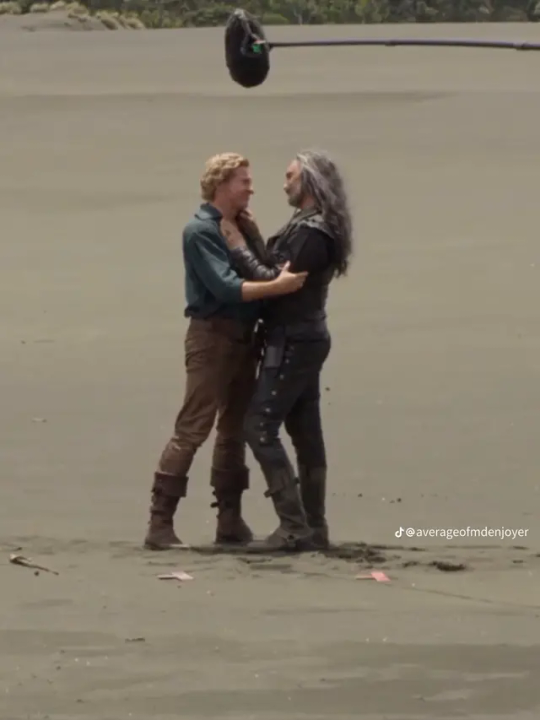
Let me live that fantasy please
#I know that's stupid#I just want that to be true#let me live my little mindfuckery#I want Jack Sparrow as Ed and Stede's son!#pirates of the caribbean#jack sparrow#our flag means death#ofmd#ofmd meta#potc#edward teach#edward teague#stede bonnet
70 notes
·
View notes
Text
In the Pirates of the Caribbean trilogy the compass is emblematic of some key motifs.
A compass that points to whatever you want most is in theory, a plot breaking item. Especially given how much of the plot of these is spent trying to find a certain place, person, or magical item. The compass solves all the problems of whoever is holding it. But in effect, that’s not true because in many, if not most, cases the compass actually doesn’t work very well because the holder’s desires are too inconsistent, unreadable or uncontrollable. Which leads to a lot of manipulating and deception to try to make the compass actually useful.
This fits in with the description of Davy Jones’ lover (later revealed to be Calypso) as being “harsh, changing and untamable like the sea”. That’s a controlling concept-- the sea and the people who love it, are harsh, changing and untamable. This is why the constantly shifting allegiances and the frequent betrayals are such a key part of the story.
That point is exemplified in the story of Davy Jones and Calypso. They were in love but both were fickle and changing. She promised to be waiting for him and was not. So he betrayed her and shirked his duty. And in doing that he becomes a part of the sea (becomes a tentacle-faced sea monster). And the foil to that relationship is Will and Elizabeth. Will clearly corresponds to Davy Jones, putting Elizabeth in the role of Calypso.
With this highlighted, we find that Will’s defining trait is his constancy. From his first introduction-- Will is hardworking (he runs the blacksmith shop for his master) and disciplined (he practices sword fighting three hours a day) and he’s unwaveringly honorable (his sense of honor changes over the course of the series, most notably in the first movie shifting from following the strict social codes of the time to a more personal conviction of right and wrong). And most importantly, Will is loyal. Will loves Elizabeth and that does not change. Ever. Even when he thinks she loves someone else. The only thing that ever challenges that is when being with Elizabeth comes into conflict with his loyalty to his father, and even there, Bootstrap tells us that if it comes down to it, Will would pick Elizabeth. As a result, Will is probably the person for whom the compass works most consistently.
Elizabeth is connected to Calypso not just because of her analogous relationship to Will, but also within the third movie by Sao Feng mistaking her for Calypso. Elizabeth is also more piratey than Will, right from the start. In the first movie, it’s Elizabeth who since childhood has had a fascination with pirates, and she more completely aligns herself with the pirates. As a result she becomes King of the Brethren Court and it’s a role that fits. If we think of the pirates as being Calypso’s people (her harsh, untamable, changing people) and she their sort of patron goddess, then as King Elizabeth also could be thought of as something like Calypso’s chief acolyte or high priestess, or even Calypso’s representative to the people. And she is like the sea, harsh and untamable. She’s fiercely ready to fight (grabbing a sword off the wall when the Pearl first attacks her home, stabbing Barbossa in the chest even within the first half of the first movie) and she’s the one continually rallying others to fight back (which is in itself an arc from the first movie when she tries to rally Jack’s crew to go fight and they leave, to the final battle in three when she gives the big speech before they enter the maelstrom and this time everyone follows her). Elizabeth’s constancy, however, is the one that’s tested. In the first movie, there is never any doubt about her love for Will. But in the second, we’re presented with the idea that Jack and maybe also Norrington may be a temptation to Elizabeth. Will she choose someone else? This question lingers somewhat into the third movie but mainly switches into a temptation of just choosing herself--being tempted just by the idea of not being answerable to anyone, as represented by the conflict of her shutting Will out of her decisions. Ultimately, even though she may be tempted by Jack or by independence at the expense of all else, her love for Will is still there and that’s what she chooses. Hers is less a constancy of nature and more a constancy of choice. Loyalty is not her defining trait but she chooses it anyway, for Will.
Calypso had to wait for Davy Jones, and even though she knew he was coming back, she wasn’t there. Elizabeth was separated from Will and fought her way back to him when she could and waited for him when that was the only choice left to her. Davy Jones was betrayed by Calypso, so he betrayed her. Will believed Elizabeth betrayed him, and he stayed loyal to her. Jones put his heart in a chest and locked it away. Will put his heart in a chest and gave it to Elizabeth. Will and Elizabeth live out the story of Calypso and Davy Jones but they do it right.
This ties back into the broader ideas about freedom. Piracy and the sea are used to represent freedom in the trilogy. Jack makes this explicit at several points, as does Barbossa. The East Indian Trading Company and Beckett are all about subjugation. Davy Jones, in his betrayal of Calypso, becomes that too. Not only does he give the Brethren Court the means to bind Calypso in human form (thereby subjugating--taming-- the sea), he also becomes the instrument of control through the use of his heart. The pirates, led by Elizabeth the representative of the sea and Calypso, fight to free the seas and that’s what they end up doing.
But the freedom of the pirates is not wholly a good thing. It’s harsh and untamable and changing. It’s Calypso not staying true to the man she loved. It’s backstabbing and double-crossing and switching sides and constant deception. The pirates get that freedom back and we’re shown exactly where that leaves them: Barbossa and the crew abandon Jack again, and Jack steals from them again and there’s a cyclical nature to it all-- we’re back where we were at the beginning of the first movie: Jack is alone in a dinghy chasing some new treasure and Barbossa is off on the Pearl doing the same. And that’s the Code-- “take what you can; give nothing back” and “he who falls behind gets left behind”. They got what they wanted but it’s still just chasing the horizon, pursuing a goal they will never reach. And they will always ultimately be alone in that, because their freedom comes at the expense of trust and love.
The cyclical unrest is not the fate of Will and Elizabeth though. They don’t fall to the extremes of either the Company or the pirates. They are free but they choose to surrender a little bit of that freedom. In the climax they choose to get married, binding themselves to each other. They each no longer have total abandon to do whatever they want, but that’s not a bad thing. It’s a source of strength and happiness to them both. In a similar way, Will binds himself to the Dutchman, willingly taking on that duty and in so doing sacrificing some of his freedom but in the name of something worthwhile and right. Thus, in his hands, the Dutchman isn’t a curse or a terror, it’s a solemn, one might even say sacred, duty that sets things right in the world rather than attempting to control it or circumvent the natural order. And rather than the captain being a tyrant, he’s a protector and a caretaker. Elizabeth, as an embodiment of the sea is no more tamed, no less harsh, but she is making a choice to tie herself to Will. Elizabeth and Will have the ultimate triumph because they realize that freedom, while worth fighting for, is not the be all end all. Love, duty, honor, and goodness/moral rightness, are all worth willing giving up a little freedom for. But that is the opposite of subjugation and through it they become more fully realized, more fully themselves.
And Jack contributes to this too. Jack, while mostly remaining in the anarchic freedom of the pirates, makes two notable choices that run completely counter to it. First, he does what no pirate is willing to do and votes for someone other than himself to be king. He surrenders a little bit of freedom to Elizabeth so that she can be king and lead them into a war that must be fought for their own benefit (because the pirates’ unwillingness for any sacrifice would have led them all to destruction). Secondly, he gives up his chance for immortality (the ultimate freedom, he calls it) by letting Will stab the heart. One for Will, one for Elizabeth, together representing their impact on him. And their side only wins because Jack has learned from Will and Elizabeth, in some small way that sacrifice and surrender for the sake of love and what is right are worth the cost.
Love is sacrifice and surrender and Will and Elizabeth get that and spread it to others around them. And that’s why they’re able to set the world right, and that’s why they’re the heart of the franchise.
#potc#will turner#elizabeth swann#jack sparrow#pirates of the caribbean#elizabeth turner#cogent metas#willabeth
600 notes
·
View notes
Text
*slaps the hull of a ship* this bad boy can fit so many gay pirates in it
#ofmd incorrect quotes#ofmd#our flag means death#taika waititi#rhys darby#ofmd meta#also black sails#black sails#and pirates of the Caribbean is very bisexual
794 notes
·
View notes
Text
Will Turner is not smart
Okay, so. I like Will. I enjoy him a lot. He’s got a good sense of humor, he’s brave, he’s pretty, he has excellent taste in women—he’s got a lot of good qualities.
Brains are not one of those qualities.
I never realized this when first watching the movies, but, uh. Will makes a lot of… questionable choices. And sure, from a Doylist perspective there are good reasons for Will to do what he does in a lot of cases. But from a Watsonian perspective he can be a little… unhinged.
Let’s look at Curse of the Black Pearl, shall we?
Unhinged Decision #1: Crossing blades with a pirate
This is a bad choice. First of all, I don’t care how many hours a day Will practices swordplay—he’s not going to be able to win in a fight if he’s never faced a real opponent. And since it seems like this is just Will practicing alone in the smithy while his master drunkenly sleeps, we have to assume that this is Baby’s First Sword Fight. Jack literally questions the wisdom of this decision in the movie, and he is right to do so, because it is a bonkers move.
It is an especially bonkers move because there are dozens of Navy officers running through the streets right outside looking for Jack. All Will has to do is shout and they’ll come running. They do come running, in fact, when they hear the commotion of the sword fight! There is no good reason for Will to engage in a sword fight with Jack Sparrow.
It’s great from a movie perspective, don’t get me wrong. This is my favorite sword fight scene literally ever. But in-universe, this is a weird and irrational decision to make. Even if Jack did “threaten Miss Swann”. Unhinged.
Unhinged Decision #2: Springing Jack from jail
This refers both to the decision and the execution of that decision.
So, in the sword fight above, Will makes it very clear that he does not like pirates. So clear, in fact, that he says, “I practice three hours a day so that when I meet a pirate, I can kill it!” Not him, it.
But Elizabeth has been kidnapped and Will is desperate. The Navy doesn’t think Jack knows where the Pearl makes berth, therefore won’t consult him, but Will goes to talk to Jack and finds out that he does know where it makes berth.
A reasonable person might share this information with the Navy. Hey, Norrington, Jack Sparrow here says he’ll lead you there if you promise you won’t hang him. Norrington might resist at first, but he doesn’t exactly have any other leads. He can probably be convinced.
But let’s say that Will does tell Norrington, and Norrington says no, because Jack Sparrow is a dirty liar who lies and will lead them on a wild goose chase, wasting time that could be spent looking for Elizabeth. Okay, Will—it is now a reasonable decision to spring Jack from jail.
Will makes a bargain: he will break Jack out, and Jack will lead him to the Pearl and help him get Elizabeth back. Will fulfills his end of the bargain, and then waits as Jack collects his sword and pistol.
This is how you get murdered, Will! This is a pirate! He literally held you at gunpoint hours ago. What if he lied, like pirates are wont to do? What if you free him and he just murders you and goes on his merry way? What’s stopping him?
None of this occurs to Will. Unhinged.
Semi-unhinged Decision: Stealing the Interceptor
Note that I did not say stealing a boat. If reason fails and the Navy won’t let Jack lead them to Isla de Muerta, then procuring transportation does become necessary. Will and Jack are going to need a boat.
Thing is, Port Royal is… a port. There are lots of boats around. All shapes and sizes. Most of those boats aren’t defended by Navy soldiers, and probably some of them could be reasonably manned by two people. Jack, after all, made it from Tortuga to Port Royal in Anamaria’s little one-mast boat. There are surely similar vessels docked in Port Royal, and I can’t imagine that it would be harder to commandeer one of those than it would be to steal a ship from the Navy.
Sure, they couldn’t pick up a crew in Tortuga in a smaller vessel, but they wouldn’t need a big crew if they stole a smaller vessel. Jack’s plan seems to be negotiating with Barbossa for the return of the Pearl, so there’s no real reason that he needs a crew for that, either. Yes, he’ll need a crew to sail the Pearl again, but surely if he can negotiate for the ship then he could negotiate some sort of transfer.
This gets a pass on being totally unhinged because time is of the essence. They need to get to Isla de Muerta before Barbossa and his crew spill Elizabeth’s blood, realize she’s the wrong person, and murder her in retaliation. They have to get there quickly, so they need the “fastest ship in the Caribbean.” I don’t know enough about sailing to say whether the detour in Tortuga to pick up a crew undermines the speed of the Interceptor, so… semi-unhinged.
Unhinged Decision #3: Promising the Interceptor to Anamaria
What are you doing, Will? That’s not your boat. That’s the Navy’s boat! Even if you bring Elizabeth back, they’re going to be very upset about you giving their ship to a pirate! You have a much better chance of being pardoned for the capital offense you’ve just committed if you return their ship along with Elizabeth. Unhinged.
Unhinged Decision #4: Knocking Jack out
Why, Will? Why did you trust Jack all this way only to betray him now? It appears, from the movie, that Will overheard that he is “leverage” and believes that Jack is going to trade his life for the Pearl. But he doesn’t realize until later that his blood is needed to break the curse, because he’s still in denial about his father being a pirate.
Will, if the pirates didn’t need your blood, why would they give a shit about you? They certainly wouldn’t trade away an entire ship just to, what, kill you? Just what sort of bargain do you think Jack is trying to strike, here? Unhinged.
Unhinged Decision #5: Rescuing Jack in the most dramatic way possible
We’re skipping to the end here. Will putting a gun to his own head is a good call in context, and him failing to smartly word his bargain with Barbossa is a forgivable mistake. Decent to good decisions the rest of the way through. Jack’s rescue, though…
Will has already demonstrated that he can break Jack out of prison easily. I doubt the Navy has had time to change the structure of the cells—the doors can still be lifted free with leverage. Can’t you just… spring him from jail the same way? Or maybe take whatever Isla de Muerta gold you used to buy your fancy outfit and showy hat, and instead use it to bribe someone else to do it so you have plausible deniability?
There are so many people at the hanging, Will. So many soldiers with guns. So many witnesses to you doing crime. (This will come back to haunt you in future films, Will!)
Will explicitly states “If all I have achieved here is that the hangman earns two pairs of boots instead of one, so be it. My conscience will be clear.” Oh yeah? Well I’m pretty sure Jack would prefer that the hangman earned zero pairs of boots, and that you’d planned a better rescue.
Will gets lucky because Elizabeth loves him back and convinces her father not to hang him and to let Jack get away, but Will couldn’t count on any of that and seemed 100% prepared to die. Unhinged.
40 notes
·
View notes
Text
It’s interesting how The Curse of the Black Pearl begins with Elizabeth and Will, and only after we get introduced to Jack. They are all main characters, however that choice seems interesting to me. Additionally, the way he is introduced is like a second first scene of the movie, it could have begun with Jack on that boat, and it would have been a great beginning. But instead we begin with Elizabeth. And by the time we meet Jack we already know: that she is interested in pirates, the way everybody in her world treats pirates, the way she and Will met, the fact that Will came from a pirate ship, and the fact that there is a ghost pirate ship attacking other ships. And only THEN we see Jack on his sinking boat, the skeletons of pirates foreshadowing Barbossa’s crew and Jack’s entire goal: to find a ship. And then we learn that it’s not just some ship, but the Black Pearl, the Pearl that Elizabeth saw ten years ago. It’s clear to us that he and Elizabeth will meet, because they are the main characters, but even before they do we can see a connection between them.
At World’s End’s ending is also built the same exact way. It ends with Will leaving Elizabeth on the shore, their story that begun in cotbp is logically ended. That scene where she stands alone on the beach could have been the end of the movie. But instead they show us Jack, who is facing the exact same problem he was facing at the beginning of cotbp — his ship is stolen (by Barbossa, no less), and he sets out into the ocean on a small boat to get it back. That is the true ending of the story. It’s interesting how Jack, despite changing as a person throughout the story (he chooses his friends over his beloved ship, he sacrifices himself instead of running away, he sees Elizabeth for what she really is and most importantly, he gives up his dream of roaming the seas forever to save Will), he never changes as a, well, character. Elizabeth is a governor’s daughter in the beginning, and a pirate king at the end. Will is a smith, a simple honest working man, who ends up becoming Davy Jones himself. But Jack is exactly the way we met him when we part with him: a pirate chasing treasure (the black pearl).
It’s a very interesting consecutive storytelling choice that differentiates Elizabeth and Will from Jack. They are the main characters, and Jack is a secondary character more than a main one. They are the ones who get thrown into the story, into a world entirely different to their own, but Jack? Jack IS the world. Jack represents the ending age of piracy, the magic and the freedom of it. Jack is part of the story that Elizabeth and Will find themselves in. He changes as a man but he doesn’t change as a symbol, his role doesn’t change. That’s why the next two movies and their endings aren’t interesting or satisfactory to me, Jack becomes Elizabeth/Will and starts doing something outside of his initial fate. Him getting the Black Pearl at the end of cotbp is good because the movie itself has a happy ending for everyone. Will and Elizabeth are together, and Jack sets off to roam the seas, he’s still piracy, and they are still the main characters. At the end of dmtnt he observes them, they get their happy ending, but he sets his goal “beyond the horizon”. All of his enemies are dead and he has changed from a character representing the restlessness of piracy to a character with his own story apart from being a pirate in the Caribbean. He has his story and goals within the idea of him representing a pirate’s life, but the moment this unending way of life is lost on him, his own personality is lost on him.
#pirates of the caribbean#potc#curse of the black pearl#at world's end#dead man’s chest#jack sparrow#elizabeth swann#orlando bloom#will turner#keira knightley#meta#storytelling#davy jones#gore verbinski#disney#potc awe#potc 3#potc 1#black pearl#pirates
146 notes
·
View notes
Text
Highlighted Posts - Fandom Topics
For some explanation, see serious topics post.
Avatar the Last Airbender / Legend of Korra:
Aang, forgiveness and violence in The Southern Raiders (meta).
Aang’s (lack of a) character arc (meta) + same response, posted independently from the original chain post with a bit of revisions (meta).
Avatar, violence and last second anti-killing rhetoric (meta).
The actual advice the past Avatars gave Aang (meta).
Aang vs. Ozai final battle and Star Wars influences (meta).
The Great Divide is good actually (meta).
Aang being rewarded by the universe? (meta).
Third season Scorched Earth plan out of left field (meta).
Bloodbending and Energybending (meta).
Katara didn't have a “plot armor” in the final battle with Azula, she's the epitome of a warrior (meta).
Katara and non-lethal battle winning (meta/joke).
Katara didn’t beat Pakku (meta).
Katara didn’t choose Aang “over” Zuko (meta).
Anastasia!Zutara AU (headcanon).
Mai and Zuko, what should have been (meta).
Mai happily joined Azula to hunt Zuko (meta).
Kanna and Pakku... why??? (meta/joke).
Gender equality in the Fire Nation and WW2 equivalents (meta).
Legend of Korra, the status quo and the institution of the Avatar (meta).
Making Korra’s dad chief is just… awful (meta).
Harry Potter:
The Malfoys didn’t have a redemption in canon (meta).
Michael Gambon is great, you guys are just mean (meta).
Snape, Dumbledore and the Defence against the Dark Arts (meta/joke).
No thanks, I don’t need a young Snape movie (joke).
What Harry’s reaction to his name being pulled from the Goblet should have been (joke).
The Tri-Wizard tournament has no rules (meta).
Star Wars:
Star wars and Pirates of the Caribbean are the same story (meta).
Kylo Ren and redemption in the Star Wars universe and Hollywood [tlj post] (meta).
DC:
so... does Superman have an appendix? (joke).
Why Selina Kyle never goes to Arkham (joke).
The Scorpion King/Wonder Woman comparison (joke).
Marvel:
Infinity War and the horror of the snap (meta).
Who’s the avengers’ designer? (joke).
Black Panther and The Lion King similarities regarding women (meta).
Shipping in the MCU (joke).
Antman and family (joke).
Pirates of the Caribbeans:
Elizabeth and Will’s relationship is the heart of the movies (meta).
The best things about PotC (meta).
Disney:
I sort of wrote a one-shot about the bimbettes from Beauty and the Beast (fanfiction).
Belle in the Hunchback of Notre Dame (meta).
Del Toro, monstrosity and Beauty and the Beast (meta).
Inner Workings is amazing (meta).
Frozen’s Anna and Hans (joke).
Quasimodo is awesome (meta).
Around the world with Captain Phoebus (joke).
Pocahontas’ ending is subversive as fuck (joke/meta).
Hercules didn’t know who Hades was (joke).
Other:
Bullshit “feminist” retelling and Mad Max Fury Road (joke/meta).
“Feminist” retellings explanation (analysis).
She-Ra and the inherently good protagonist (meta).
I hate the ending of She-Ra (meta).
Once upon a Time, Regina and redemption (two diverging threads of the same post) (meta): First and Second.
Ross Geller isn’t that bad, you guys are just mean. Or: The unbelievable cruelty of what Carol did to Ross (meta).
Bella Swan and Hermione Granger comparisons are bullshit (meta).
Twilight and depression (meta).
New Moon reread comments (meta).
The Good Place is the greatest show in history. But also I have thoughts (meta).
The single most beautiful Geralt and Jeskier art ever made [The Witcher] (fanart).
Dimitri wanted to find the real Anastasia all along in hopes that she survived the revolution [Anastasia 1997] (meta).
Godzilla, Pacific Rim and Hollywood: between grim-dark and camp (meta).
Wednesday Addams and the usurpation of the summer camp for rich white kids (meta).
Debbie Jellinsky is the best [The Addams Family Values] (joke).
Achilles and Patroclus sitting in an urn. K.I.S.S.I.N.G. (joke).
Of course the Jewish women are the witches in Oz the Great and Powerful… (joke/meta).
Bird Box and mental illness (meta).
My problems with Carmen San Diego (meta).
Ice Princess and teenage movie tropes. Or: They're lesbians Harold (meta/joke).
Lord of the Rings life goals (joke).
The School of Good and Evil and that little bit of antisemitism… (joke).
Game of Thrones / House of the Dragon genetics are weird (joke).
Why wouldn’t I keep talking about old fandoms? (joke/analysis).
I hate Barbie. Sorry. (meta).
#highlighted posts#avatar the last airbender#atla#atla meta#legend of korra#lok#harry potter#hp#hp meta#star wars#sw#sw meta#pirates of the caribbean#potc#potc meta#disney#disney meta#dc#dc meta#marvel#marvel meta#anastasia 1997#the addams family#she ra and the princesses of power#satpop#twilight#friends#once upon a time#ouat#the witcher
11 notes
·
View notes
Text
thinking about how barbossa is canonically the only person in POTC to have come back from the dead. yeah, jack came back from the locker, but the locker isn’t the same... it’s a punishment, not an ending. what does it mean for barbossa’s character in AWE that he has literally seen death?? one could argue that in AWE, he acts with an abandon even stronger than the fuck-everything-i’m-an-undead-skeleton-anyway recklessness he had in COTBP under his curse. so... does that mean barbossa has seen death, and so he no longer fears it, even welcomes the possibility? i love the thematic message that that sends, especially in contrast to jack, who’s so hell-bent on immortality in AWE BECAUSE he fears death and all it symbolises for him and for piracy.
124 notes
·
View notes
Text
Demoted to Dragon
The former Big Bad now works as the new Big Bad's right hand man/woman.
Generally, when a Big Bad is defeated is replaced by a new one, but when the previous one is still there, one of the things the former antagonist can do is work for the new one as his right hand man.
Demoted big bads will frequently become the Starscream, especially if the only reason they were demoted was because the other big bad happened to have an advantage and the alternative would mean certain death.
Although, some Dragons will do the opposite: they will happily accept the new position, be actually loyal to the new main antagonist and have a trustworthy relationship, often because the Dragon will realize that he works better and more efficiently by working for someone else, and the Dragon may actually become a much bigger threat than when he was the main villain thanks to the help and resources of the new one.
Examples:
Transformers The Movie (1986): Megatron, the main antagonist of the first two seasons of the cartoon, is left for dead by Starscream in the void of space, only to be found by Unicron. Unicron turns him into his slave, reformatting Megatron into Galvatron and ordering him to destroy the Autobot Matrix of Leadership.
All Dogs Go To Heaven: Scarface was the main antagonist of the original movie, but in the sequel movie he played lackey to Red and to Belladona in the series.
X-Men Apocalypse: Magneto is NOT the leader of the supervillain team; this time around, he plays second fiddle to Apocalypse.
My Hero Academia: After Shigaraki defeated Re-Destro the leader of the Meta Liberation Army, he becomes a subordinate of his when they form the Paranormal Liberation Front and declare war on the Heroes.
Gravity Falls: Gideon was the Big Bad in the season 1, but he becames Bill Cipher's enforcer in the season 2 finale after Bill fulfills his plans ands brings about the "Weirdmaggedon".
Teen Titans (2003): Slade is demoted to Trigon's henchmen when the latter tries to take over the world. An unusual case where the former big bad is actually MORE of a threat to the heroes when he's serving as someone else's henchman, because Trigon gave him a truckload of powers in the bargain.
Stitch: In the third season of the anime, the previous big bad Hämsterveil partners up with a new villain named Delia. However, considering that Delia often tortures him when he fails her and that she creates an experiment that is more powerful than Stitch, it's clear that Hämsterviel is no longer the main antagonist this go around.
Street Fighter: In the original Street Fighter, Sagat was the final boss, but in the sequel Street Fighter II, he's simply the last fighter the player must face before M. Bison.
Pirates of the Caribbean At The World's End: The previous film's big bad Davy Jones is demoted to being a henchmen for Cutler Beckett. Justified by Beckett possessing the heart of Davy Jones, and therefore being quite capable of having Jones killed and replaced if he doesn't obey Beckett's orders.
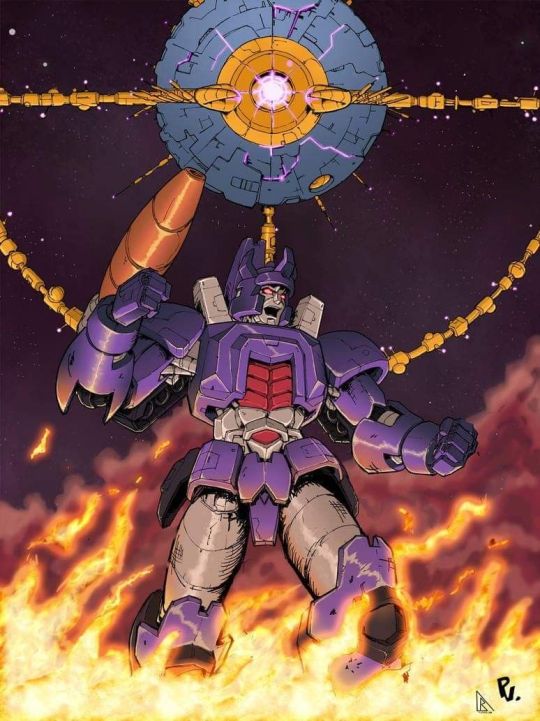



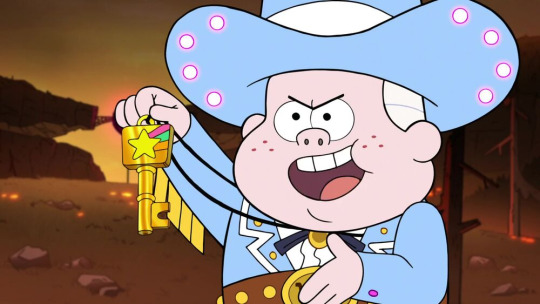
#transformers#transformersthemovie#megatron#unicron#galvatron#all dogs go to heaven#x men#x men apocalypse#gravity falls#gravity falls gideon#bill cipher#my hero academia#mha shigaraki#redestro#meta liberation army#teen titans#slade#trigon#stitch#lilo and stitch#street fighter#pirates of the caribbean#davy jones
4 notes
·
View notes
Photo
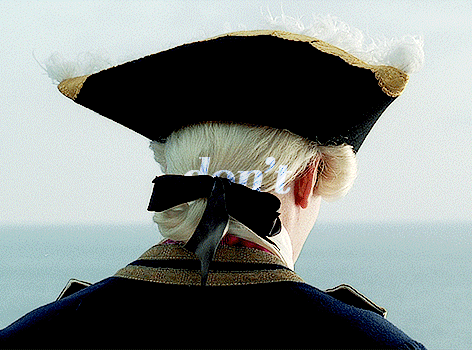

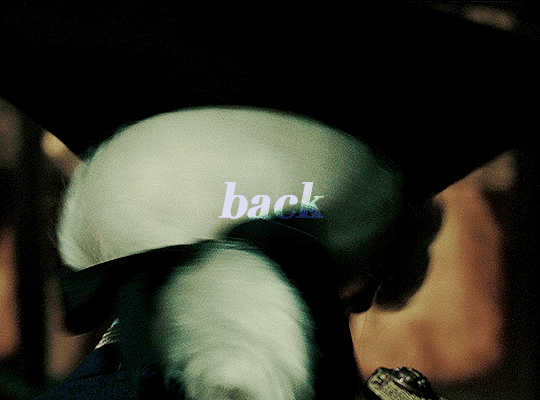
close enough that light we can see
my doubt betrays the better of me ♫♪
#pirates of the caribbean#potcedit#disneyedit#filmedit#james norrington#*userbolt#if you look closely you can see me fighting for my life trying to get the colors from these movies to match#can someone else write the meta for this. i'm so sad#gif: potc#norribeth
377 notes
·
View notes
Text
I’d argue that, unintentionally or otherwise, On Stranger Tides is a fairly proletarian film. You can basically boil down OST to the story of a bunch of men being forced to work under the worst boss(es) ever; The enslaved sailors of Blackbeard’s crew are lied to about the premises and nature of their work, and as I said, are enslaved with no pay. They’re forced to do increasingly ludicrous and dangerous tasks for their master Blackbeard, who has the gall to call them cowards when they attempt to flee from the mermaids... Even though Blackbeard himself, conspicuously, is not in the water participating in the hunt with them.
Jack Sparrow may as well be a stand-in for unions, someone who’s looking out for his fellow worker, doing his damnedest to keep as many people alive as possible and forsaking his personal goals for the wellness of others. He might grouse about having to rescue everyone at Whitecap Bay, but we know he’d do it again, just as he jumps down the waterfall to find the chalices so nobody else has to, and sacrifices his shot for immortality to save Angelica (whose devotion to her father has him callously attempt to take her life for his own).
He’s the guy inciting Blackbeard’s crew to mutiny against him, and tries to take the fall for the Cook, knowing he is needed but his fellow slave isn’t (It fails, but the effort is what counts). Blackbeard’s zombies are the natural extreme of unquestioning servitude to their master, and there would’ve been a scene where the Cook is revealed to have become a zombie himself, which plays into the dehumanization of everyone’s labor.
Blackbeard’s crew only stick around and work for him as long as they need to, as much as they need to; But as soon as their boss is struck down, they have zero qualms with abandoning him to his fate and siding with their liberator Barbossa, for whom they end on an infinitely more happy, hope-filled note. Barbossa is a fellow pirate who works down and dirty on their level (in the previous film, he waxes poetic about pirates who tame the sea through the sweat of their own brow, and proves he means it), and has an actual connection to his crew.
Likewise, you’ve got the navy, working for Barbossa, who is working for King George II. There’s a scene where they realize they’re all sailing towards certain doom at Whitecap Bay, but Barbossa pulls everyone back into line by waxing poetic about their national loyalty and ideology, chanting “Are we not king’s men?” This works, and what do these king’s men get for sticking to their posts?
Most are unceremoniously massacred by the mermaids. Barbossa, who is revealed to only be in this for himself and has zero concern for the crown, doesn’t even bat an eye. His abandonment of his crew is first and foremost out of apathy, and not resignation to his own powerlessness against the mermaids, and everyone with him knows it.
The film ends with everyone working for King George II slaughtered, with the last and most notable death being Groves; He makes a bold yet impractical stance for his majesty, and is casually killed by the Spanish for it. The redcoats are roused to sacrifice themselves for leaders who don’t care and are lounging on food and drink (King George II and Barbossa), and only ever suffer for their ideological loyalty. Similarly, Blackbeard’s zombies stay loyal to him even when he is struck down, but all they get for their efforts is being crushed under a giant pillar.
As I said, Barbossa DOES play the role of an uncaring boss to the redcoats, but he is beholden to another uncaring boss of his own, King George II, whom the movie gives a fairly unflattering, pampered portrayal of. Barbossa may enjoy the finer things in life too, but he’s still a hardworking man who recognized the callousness of the crown, and only used it for his own agenda, rather than allow the other way around to occur.
Likewise, you have him and Gibbs, who is a former navy sailor who left to become a pirate. Once more, he is dragged into servitude, but he makes sure to negotiate his own survival by recognizing the value of what he can provide, and holding onto that; This mindfulness keeps him alive, and allows Gibbs to escape to safety before the final act, and even retrieve the Black Pearl and other ships for his luck.
OST argues this; Only work for your employer for as much as you need to, but once you have what you want, get out ASAP. Barbossa knows the crown doesn’t care for the expendable redcoats, so he prioritizes his own agenda, fulfills it, and leaves on a triumphant ending. Blackbeard’s crew do what they need to do to survive, then skedaddle. Anyone else who bears through the work for the sake of it, such as Angelica or the zombies or redcoats, are only punished for their blind trust.
Blind ideological faith towards your boss will get you nowhere, so make sure to know the value of what you have to offer, and leverage it as much as possible. Which, given PotC’s emphasis on freedom and defying capitalistic authority... There’s a good argument to be made that this pro-Union film is intentional about its message.
#pirates of the caribbean#on stranger tides#potc#meta#jack sparrow#blackbeard#hector barbossa#joshamee gibbs
36 notes
·
View notes
Text
✨Ahoy✨
[A] --- more shameless self-promotion (because I'm just so stupidly happy about this fic and can't get over how much fun it was to write) but also
[B] --- time to shout out some Sparrington! Here's to the first pairing I ever loved, because their back-and-forth banter and that half-flirty, half-philosophical thing they've got going on throughout Curse of the Black Pearl is both hot as fuck and essential to what makes that movie great (a hill I am willing to die on). Now, for some fic recs:
If you are a fan of the pairing, or of Age of Sail adventure stories, or of great writing in general, and you have not yet read Between Wind and Water by rexluscus -- dooooo iiiiittttt. That shit rocks me to my bones every time. It's very densely plotted which makes the romantic elements feel that much more believable, woven into a world that's fraught with allies and rivals and a brewing war - gorgeous and brutally real.
For a spicy enemies-to-lovers seduction, there's this delicious one-shot, alternative timeline where James, not Elizabeth, gets stuck on the island with Jack and the rum. 🔥🥵
Also I have to give major credit for the fic above (Which fic? This one? *kiss*) to Red & Gold, origin of "Sparrow/Norrington as the mature bemused couple wreaking havoc on two idiots who don't realize they love each other." (in Red & Gold, the other pairing is Gillette/Groves....... you know....... the two naval lieutenants who appear in Curse of the Black Pearl alongside Norrington for all of, like, eight seconds? ...... Andrew "a little mermaid flopped up on deck and told him the whole story" Gillette and Theodore "that's got to be the best pirate I've ever seen" Groves:
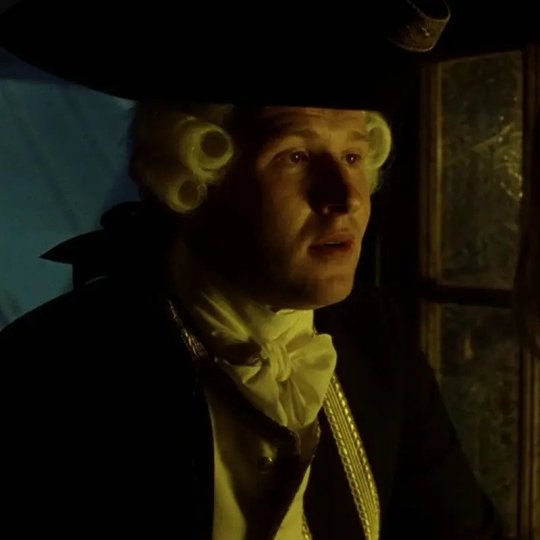
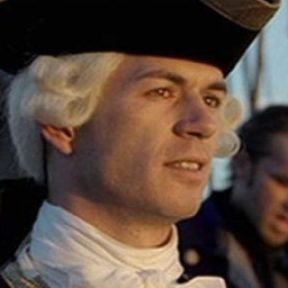
..... them, really -- and to any Navyboys shippers out there if by some miracle you're reading this, you have my heart! it was the wild west out there, back on livejournal... there were dozens of us, dozens!)
Which leads me to my next "point" which is I am so fucking thankful for OFMD for reminding me of everything I used to love about fandom, and for showing me there was no shame in loving it in the first place.
When I first loved Jack and James, I was young and sad and embarrassed about everything, but especially about fandom. Now I get to be a proper fuckin' grown up and write shit that makes me smile and spend my time marveling at all kinds of others' gorgeous creation about the same characters, and fuckkkkkk, man, it's just so beautiful 😭
Here's to all of the flags, long may they wave. Cringe but free!
#ofmd#potc#pirates of the caribbean#meta#our flag means death#fic rec#sparrington#jack sparrow#james norrington#idk I'm just so jazzed on everything#if you're reading this guess what I love you#gay fuckin pirates lets gooo
48 notes
·
View notes
Text
The fact the CotBP is entirely about a crew of people trying to regain the ability to die because that risk is worth it to experience human life again is just more fuel to my argument that the trilogy is about the strength and beauty of humanity in the face of insurmountable odds.
147 notes
·
View notes
Text
It probably wasn’t intended by the creators, but if it had been, all the jokes in OFMD about the Republic of Pirates having become a gentrified tourist trap with crappy drinks and souvenirs would be absolutely beautiful digs at how Disney drove the Pirates of the Caribbean franchise into the ground until they made people sick of it, and it got so bland and corporate that it stopped being any fun years ago..
17 notes
·
View notes